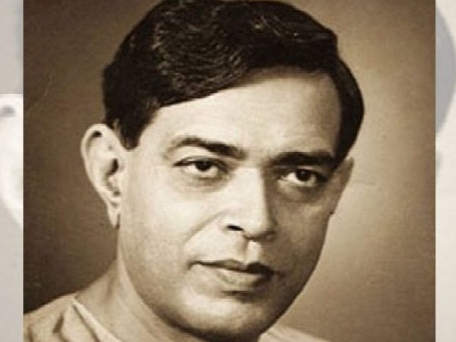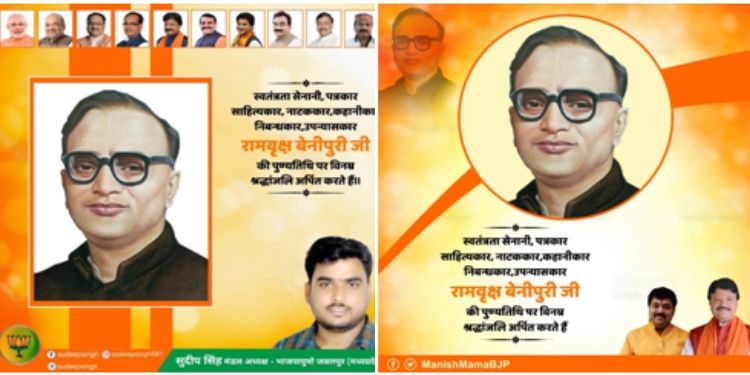This is part I of the two part series on the ‘Impossibility of appropriating Dinkar and Benipuri’ by Anukriti Gupta. The Part II can be read here.

“Samaj ko vidrohi chahiye, usse adhik vidrohi chahiye sahitya ko, kala ko” (Society needs a rebel, and a greater rebel is needed by literature, by art) —Rambriksh Benipuri ¹
The BJP and various organisations affiliated to the Sangh Pariwar have been co-opting and appropriating the legacies of those figures who, while they were still alive, were not only vigorously opposed by the ideological forbears of the Hindu Right but in some instances were even its victims and their worldview was not in tandem with BJP’s idea of India. Apart from BJP’s desire to create a historical narrative and political legacy, another obvious reason behind this kind of appropriation lies in the fact that invocation of iconic figures plays an important role in India’s popular mass politics.
In addition to the invocation and appropriation, social media accounts affiliated to the Hindu Right circulate quotes by prominent Hindi writers such as Ramdhari Singh Dinkar and Rambriksh Benipuri on Facebook, Twitter and as WhatsApp forwards after major omissions and additions to their original writings. The appropriation of Dinkar and Benipuri is not only electorally relevant for the BJP, it also contributes to the RSS’s Hindi imposition and the larger idea of one nation-one-religion-one language.
One of the most quoted verses of Dinkar “Singhasan khali karo, ki janata aati hai (Abdicate the throne, for the people are coming to claim it)” has been used by the BJP several times during its electoral campaigns. Sangh Pariwar’s another favourite verse by Dinkar is “Yaachna nahin, ab rann hoga (no more requests, there will be battle now)”. It was quoted by Hansdevacharya in the VHP Dharma Sabha in Ayodhya in November, 2018, where he suggested the government and the people to write letters to the Supreme Court seeking an early hearing on the issue of Ram Janmbhoomi.
Writers and their Words: Appropriation, Misattribution, Saffronisation
On June 25, 1975, Jayprakash Narayan addressed a massive rally at New Delhi’s Ramlila Maidan. Hundreds and Thousands of people attended this rally to protest against the autocratic rule of Indira Gandhi. J.P. sought Indira’s resignation and advocated a programme of social transformation; which he termed “Sampoorna Kranti” (Total Revolution), little did he know that in the coming decades this verse would be appropriated by the Hindu Right in India. During his speech, he reminded the protestors that the ultimate power lies with the people in a democracy and recited the iconic lines of “Jantantra ka Janm” (The Birth of Democracy), written by ‘Rashtrakavi’Ramdhari Singh Dinkar, “Singhasan khali karo, ki janata aatihai.”
Incidentally, Prime Minister Narendra Modi has referred to Dinkar’s poetry on various occasions. When he visited Ladakh in July, 2020, he chose to inspire the Indian army by reciting “Kalam Aaj Unaki Jay Bol”, a poem by Dinkar. Atal Bihari Vajpayee, Sushma Swaraj, Rajnath Singh, Amit Shah and several other leaders of the Bharatiya Janata Party, have used Dinkar’s verses to get across their political messages. Many pracharaks of the RSS have been known to use Dinkar’s poems during lectures for swayamsevaks and in their articles for Panchjanya and Organiser.
In 2015, a series of events were held across the country to celebrate 50 years of Sanskriti Ke Chaar Adhyay and Parshuram Ki Prateeksha. With an eye on Bihar 2015 polls, a grand function was organised in Delhi’s Vigyan Bhavan to celebrate Dinkar’s works. The function was addressed by Prime Minister Modi. Dinkar’s poems are most popular and circulated among the Hindu right-wing affiliated social media accounts and pages on platforms such as Facebook and Twitter. On these social media sites, Dinkar’s poems are quoted without mentioning the literal context,to fit in with their ideologies and in several instances, his poems have been misquoted by replacing certain original lines and words and circulated widely on Twitter, Facebook and as WhatsApp forwards.
“Singhasan khali karo, ki janata aati hai” was quoted by Prime Minister Narendra Modi during an election rally in Begusarai, Bihar on October 8, 2015. It was again used by the BJP in 2016 before assembly elections in Uttar Pradesh, “Akhilesh singhasan khali karo, BJP aati hai (Akhilesh vacate the throne, BJP is coming).” Dinkar’s poem about people’s power in a democracy became a popular slogan for UP polls. It is ironical how ‘Janata’ which was given the final say and power by Dinkar in his poem was replaced by ‘BJP’ in the slogan.
Dinkar’s poem about people’s power in a democracy became a popular slogan for UP polls. It is ironical how ‘Janata’ which was given the final say and power by Dinkar in his poem was replaced by ‘BJP’ in the slogan.
Dinkar wrote ‘Jantantra ka Janm’ on the historic occasion of January 26, 1950 when India’s Constitution came into effect, and the country became a republic. The poem though celebrates the new republic, it is overtly critical and skeptical of what lies ahead, in its tone and imagery. The poem reverberates with the voice and aspirations of thirty-three crore Indians. India’s population was around thirty-three crores at the time of Independence and the poem invokes each and every one of them to claim “singhasan”, the throne of the largest democracy of the world.
“Sab se virat jantantra jagat ka aa pahuncha,
Taintees koti-hit singhasan tay karo
Abhishek aaj raja ka nahin, praja ka hai,
Taintees koti jantake sir par mukut dharo.”
Dinkar’s emphasis on Taintees koti “thirty-three crores” also invokes the imagery of thirty-three crore ‘devi-devta’, the much-revered pantheon of thirty-three crore goddesses and gods in Hinduism. In tune with the spirit of the poem, Dinkar’s “thirty-three crores” are not gods but common men and women of India, struggling masses who toil on this land and deserve to claim its throne.
After 2015 legislative assembly election in Bihar and 2016 election in Uttar Pradesh, the 2019 general election and 2020 Bihar legislative assembly election again witnessed the appropriation of Dinkar and his verses. In 2019, while campaigning in Bihar’s Begusarai for BJP candidate Giriraj Singh, Amit Shah mentioned that the land which belongs to great poet Ramdhari Singh Dinkar has no place for “anti-nationals” like Kanhaiya Kumar. This kind of appropriation of Dinkar aligns him with the aggressive nationalism of the Hindu Right, brushing the socialist, progressive and humanist themes of his writings completely under the carpet.
This kind of appropriation of Dinkar aligns him with the aggressive nationalism of the Hindu Right, brushing the socialist, progressive and humanist themes of his writings completely under the carpet.
Rambriksh Benipuri, another eminent litterateur, distinguished journalist and socialist leader from Bihar appeared in posters shared by the BJP leaders before 2020 Bihar polls. In these election campaigns, the focus is not only on Dinkar and Benipuri’s ‘Bhumihar’ identity to garner upper-caste votes in Bihar but also onwho a true ‘Bihari’ is. ‘Bhumihar’ community is a forward land-owning community in Bihar and the appropriation of Dinkar and Benipuri has been electorally relevant for the BJP. However, the appropriation of Dinkar, Benipuri and several other literary figures is not restricted to BJP’s election campaigns and rallies. The co-option of Hindi literary icons contributes to Modi government’s constant push in favour of Hindi language and to the Sangh Pariwar’s imagination of Hindi-Hindu-Hindustan.

The following tweet and Facebook post omit the original lines of Dinkar’s poem ‘Parichay’, first published in ‘Hunkar’, 1935 and replace them with lines made up to highlight his caste identity. The original verses of ‘Parichay’² are;
“Na dekhe vishw par mujhko ghrina se
Manuj hoon, Srishti ka shringar hoon main
Pujarin, dhooli se mujhko utha lo
Tumhare devta ka haar hoon main
Sunoon kya sindhu! main garjan tumhara?
Swayam yug-dharm ka hunkar hoon main”
Several popular ‘Bhumihar’ Facebook pages, blogs and twitter accounts affiliated to the Hindu Right share this poem with omissions and with certain horrendous additions to change its meaning and context; and to centralise Dinkar’s ‘Bhumihar’ identity. “Swayam yug-dharm ka hunkar hoon main” is replaced by “Ki ganga ghat ka Bhumihar hoon main”.


Many caste-based websites and blogs which hail ‘Bhumihar’ caste pride include Dinkar and Benipuri in their list of illustrious ‘Bhumihars’ with unsurprisingly no mention of their socialist and progressive thoughts and affiliations.
Another poem which is quite popular on Hindu right-wing social media platforms and is shared in the name of Dinkar is ‘Yeh Nav Varsh Humein Swikar Nahi; Hai Apna Yeh Tyohar Nahi’ (‘We Don’t Accept this New Year; It is Not Our Festival’). Since 2017, this poem has been shared widely on Twitter, Facebook, blogs and as WhatsApp forward in the month of January every year. This poem is misattributed to Dinkar. The poem suggests that celebrating new year is against Indian culture. Therefore, every year the message to stop celebrating new year and return to the ‘Hindu Nav Varsh’is amplified around 1st January through this poem. Even popular Hindi news portals such as Jagran and Hindi Media have shared this poem, misattributing it to Dinkar.
The writings of Dinkar and Benipuri are appropriated by the Hindu Right for electoral gains, for uniting and strengthening dominant caste groups in Bihar and to promote the question of Hindi imposition. However, Dinkar and Benipuri cannot be saffronised; it’s important to keep asking and reminding why. The political and historical contexualisation of the writings of socialist and progressive Hindi writers and thinkers is of colossal significance in contemporary India.




